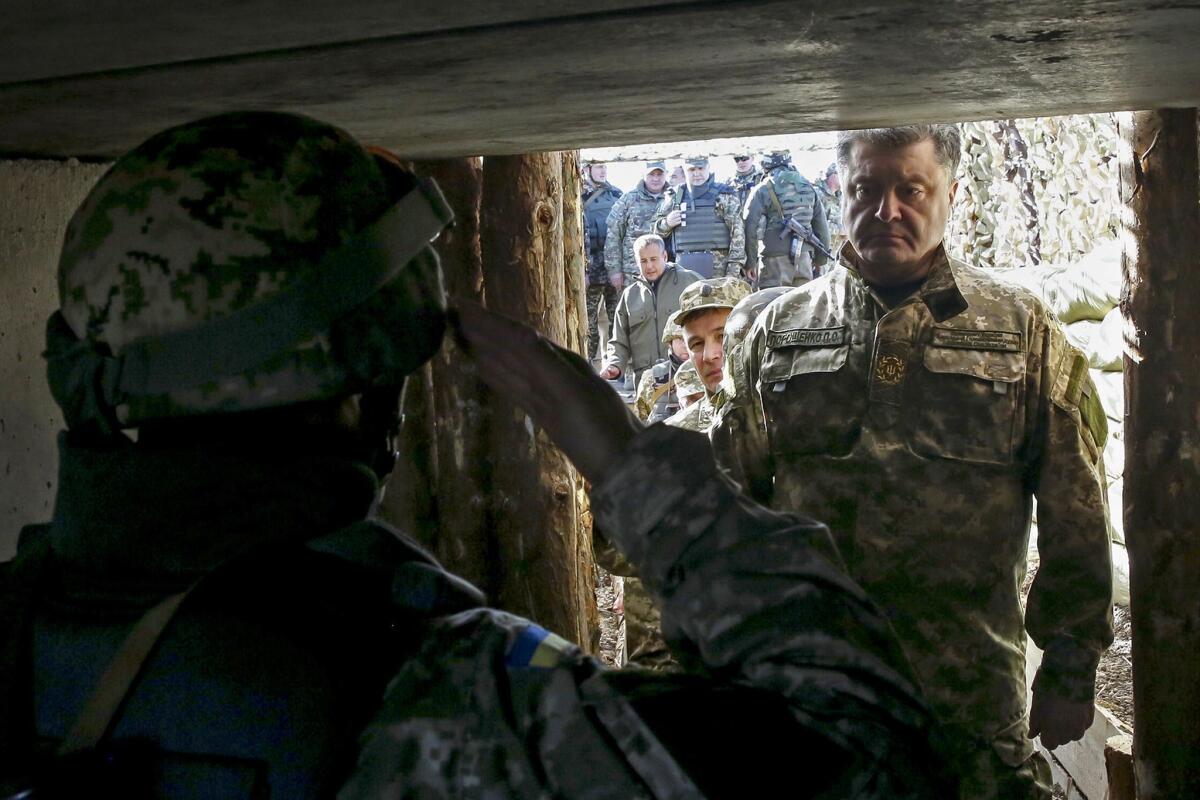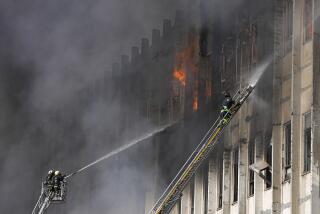Russia backing separatists’ rival elections in eastern Ukraine

- Share via
Russian officials are throwing their support behind Ukrainian separatist rebels’ planned elections for their own parliaments after warnings from Ukrainian leaders in Kiev that no power in the world will recognize the proclaimed independence of the Donetsk and Luhansk “people’s republics.”
“It is necessary to create conditions for the elections rather than to dissuade people from them,” said Russian Foreign Ministry spokesman Alexander Lukashevich. He was responding to Ukrainian Foreign Minister Pavlo Klimkin’s appeal Thursday for the Kremlin to dissuade its eastern Ukraine proxies from going through with the divisive vote.
Ukrainian President Petro Poroshenko disbanded the Supreme Council in late August and set early nationwide elections for Oct. 26 so that Ukrainians could elect representatives whose political leanings reflect the dramatically changed situation in the country over the last year.
Since Kremlin-allied President Viktor Yanukovich was driven out of office in February by protesters who viewed his policies as subjugating Ukraine’s economy and independence to Russia, the ousted leader’s allies have been occupying government buildings and security compounds and proclaiming independence from Kiev’s rule.
Six months of fighting between the Russia-backed separatists and Ukrainian forces has left more than 3,600 people dead and much of the Donetsk and Luhansk regions, home to 6.5 million people, under rebel control. Poroshenko offered the separatists a more autonomous relationship within Ukraine last month but they rejected it, saying they want independence.
Though some who claim to represent the separatist regions say they might settle for broad autonomy to determine their own economic and foreign policies, others acknowledge that their aim is secession and annexation to Russia. Igor Plotnitsky, leader of the self-proclaimed Luhansk People’s Republic, has been quoted by Russian media as saying that “sooner or later” they expect to join the Russian Federation.
The separatist leaders announced in late September that they would hold elections Nov. 2 for representatives to parliament-like bodies to govern their regions. The head of the Donetsk People’s Republic Central Election Commission, Roman Lyagin, said Friday that the vote might be pushed back to Nov. 9, citing the slow pace of candidate registrations.
“Friday is the final day when a public movement can be established to take part in the elections. Many have been holding off until the last minute, making our job more difficult,” Lyagin was quoted as saying by Russia’s Itar-Tass news agency. He said five candidates had come forward to run for the regional leadership position and that 15 parties or movements were expected to contest the legislative positions on the Supreme Council.
Boris Litvinov, leader of the newly established Communist Party of the Donetsk People’s Republic, told Itar-Tass on Sunday that local authorities had decided the election would be valid no matter the size of the turnout.
Lyagin said the separatists expected to be able to open only about a third of the 2,000 polling places in Donetsk because of “security considerations.” The head of Ukraine’s election commission, Mykhailo Okhendovsky, told journalists in Kiev two weeks ago that the government expected to be able to open polls in less than a third of the 34 districts of Luhansk and Donetsk regions, also because of security concerns over the fighting that persists despite a Sept. 5 cease-fire.
At least 331 people have been killed by gunfire or artillery strikes since the cease-fire, which was agreed to among Russian, Ukrainian, separatist and European officials as a first step toward restoring peace in eastern Ukraine.
Lukashevich, the Russian Foreign Ministry spokesman, was quoted by the RIA Novosti news agency as deeming the separatists’ election plans in conformance with the cease-fire agreement’s call for early elections to replace the deeply divided parliament elected in 2012.
Fighting is expected to escalate as the rival elections approach and both sides seek to control more territory where voters would be safe and their participation a boost for the legitimacy of the outcome.
Russian troops and their separatist allies already control territory where more than 18% of Ukraine’s 46 million population live, and they appear to be gearing up for renewed pushes on the strategic port of Mariupol on the Sea of Azov and in Kharkiv, Ukraine’s second-largest city at 1.4 million people.
Follow @cjwilliamslat for the latest international news 24/7
More to Read
Sign up for Essential California
The most important California stories and recommendations in your inbox every morning.
You may occasionally receive promotional content from the Los Angeles Times.














